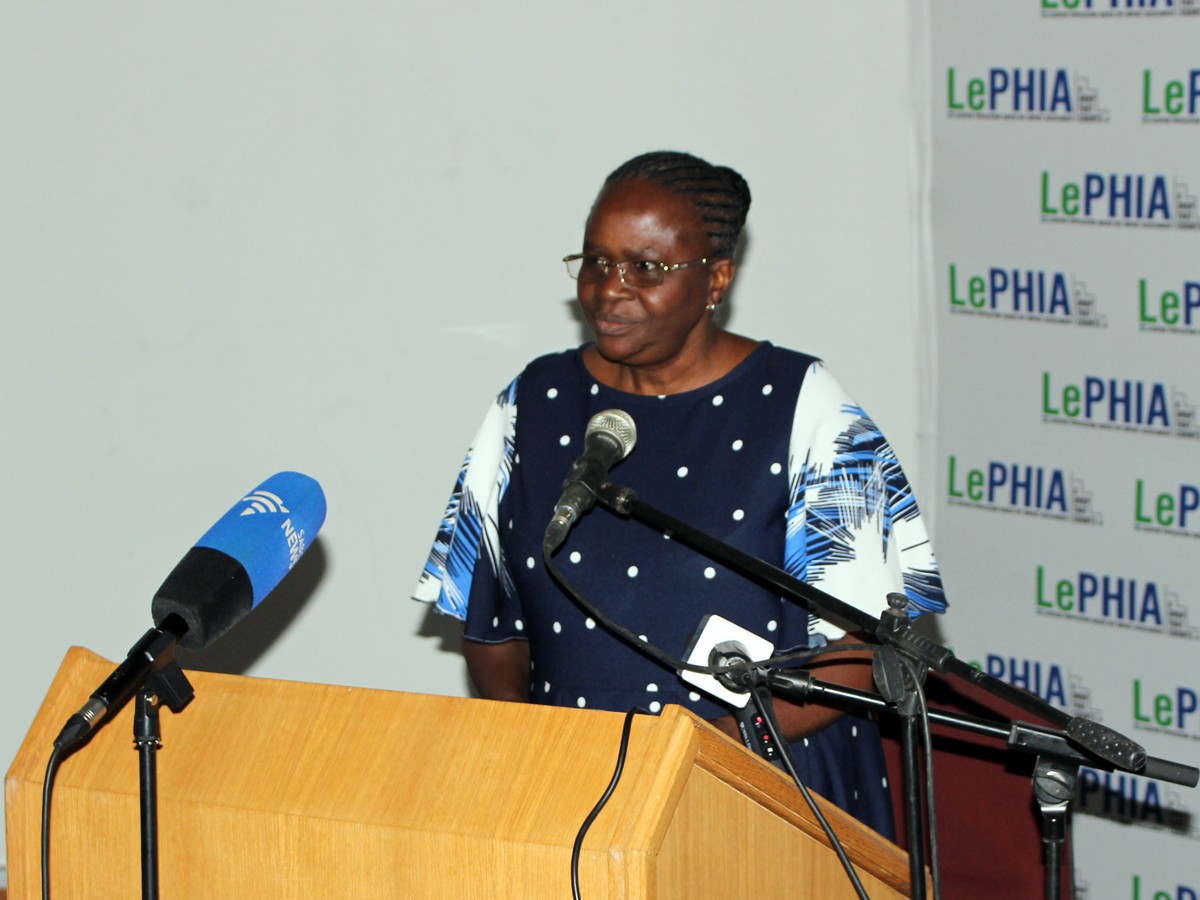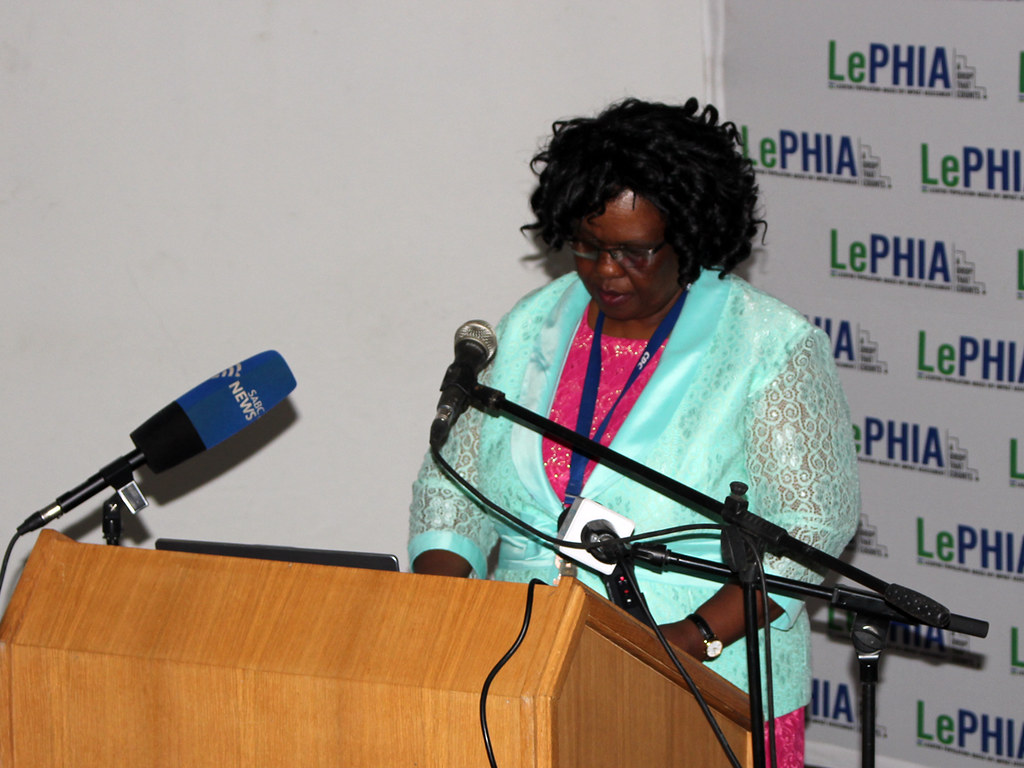Today, the Government of Lesotho, the U.S. President’s Emergency Plan for AIDS Relief (PEPFAR), the U.S. Centers for Disease Control and Prevention (CDC), and ICAP at Columbia University (ICAP) announced the final results of the Lesotho Population-based HIV Impact Assessment (LePHIA) survey. These extensive new data builds off of preliminary data announced in November 2017, which showed the remarkable strides Lesotho is making toward controlling its HIV epidemic.
The results announced today include extensive data on prevalence, incidence and uptake of HIV services for adults, adolescents and children as well as updates to previously released figures. The updated figures are based on new laboratory data showing the number of people already tested and aware of their HIV status was higher than initially reported in 2017 (81% today vs 77% in 2017) and the annual HIV incidence (or new infections in a year) is slightly lower (1.1% today vs 1.5% in 2017).
“The LePHIA Final Report released today provides a breadth and depth of data that will greatly inform our approach to controlling Lesotho’s HIV epidemic,” said Hon. Nkaku Kabi, Minister of Health, Government of Lesotho. “The Government of Lesotho is committed to continuing the HIV care and treatment programs that are working and using new data to target gaps in services where we can better meet the needs of all our citizens.”
LePHIA was conducted from November 2016 to May 2017 and included 16,000 people ages 0–59 years across 10,000 randomly selected households. It is the first national survey to provide comprehensive information on important HIV/AIDS indicators at national and regional levels and measure progress toward the globally recognized UNAIDS 90-90-90 targets to be achieved by 2020, which include:
- 81% of adults who tested HIV positive in LePHIA who already knew their HIV status
- 92% of those who reported knowing their HIV-positive status who were taking antiretroviral therapy (ART)
- 88% of those who reported current use of ART achieved viral load suppression, a marker of the effectiveness of ART
- Among children, progress toward 90-90-90 show an estimated 81% of children living with HIV previously diagnosed and 98% of those on ART; however, only 74% had suppressed viral loads
“LePHIA data show Lesotho has made great strides toward achieving the UNAIDS targets and improving care for people living with HIV,” said Koen Frederix, Technical Director, ICAP at Columbia University. “Going forward, the data will enable us in our critical task of identifying and linking to care those infected with HIV but unaware of their status.”
In addition to achieving the UNAIDS targets, LePHIA data also show gaps where Lesotho can focus its efforts:
- Reduce the number of people living with HIV: Approximately 306,000 people in the country between the ages of 0–59 years, or one out of four, are living with HIV
- Increase the number of men tested for HIV: Men were less likely than women to report ever having been tested for HIV or to be aware of their prior HIV status
- Target at-risk age groups: The rate of new infections was highest in females aged 15–24 years and in males it was highest among ages 35–49 years
- Increase condom use: More than one in three married and/or cohabitating adults who engaged in extra-marital partnerships reported not using condoms
- Increase access to voluntary male medical circumcision: Only 36.0% of men aged 15–59 years reported having undergone the procedure, an intervention shown to reduce the risk of HIV acquisition
LePHIA data also identified a gap in effectively delivering HIV services to older adolescents and young adults (15–24 years of age):
- 72% lacked comprehensive knowledge about HIV transmission and prevention, with one in four not knowing that monogamy with an uninfected partner may reduce risk of transmission
- 40% of those who tested HIV positive had not been previously diagnosed, and if treated only 77% achieved VLS
With the addition of the LePHIA results, eleven countries have released results from PHIA Project surveys: Cameroon, Cote d’Ivoire, Eswatini, Ethiopia, Lesotho, Malawi, Namibia, Tanzania, Uganda, Zambia, and Zimbabwe. Data from further assessments in the coming years can be used to assess the progress countries have made since conducting their initial PHIA survey.
The PHIA Project is funded by the U.S. government through PEPFAR and conducted by the Ministries of Health, CDC, ICAP, and other governmental and non-governmental partners. With PEPFAR support, three additional countries—Haiti, Kenya, and Rwanda—will release PHIA data during 2019 and help chart further progress toward epidemic control by 2030.
The U.S. President’s Emergency Plan for AIDS Relief
PEPFAR is the United States government’s response to the global HIV/AIDS epidemic, which represents the largest commitment by any nation to address a single disease in history. Through the compassion and generosity of the American people, PEPFAR has saved and improved millions of lives, accelerating progress toward controlling and ultimately ending the AIDS epidemic as a public health threat. For more information, please visit www.pepfar.gov, and connect with PEPFAR on Twitter, Facebook, and Instagram.
The U.S. Centers for Disease Control and Prevention
CDC works 24/7 saving lives and protecting people from health threats to have a more secure nation. HIV and tuberculosis (TB) are the world’s two most deadly infectious diseases, and CDC’s Division of Global HIV & TB works with partners to tackle these two epidemics and produce the greatest global health impact. More information can be found at http://www.cdc.gov/globalhivtb.
ICAP at Columbia University
ICAP was founded in 2003 at Columbia University’s Mailman School of Public Health. A global leader in HIV, tuberculosis, other health threats, and health systems strengthening, ICAP provides technical assistance and implementation support to governments and non-governmental organizations. More than 2.2 million people have received HIV care through ICAP-supported programs, and over 1.3 million have received antiretroviral therapy through such support.
This press release originally appeared on the PHIA Project website.









